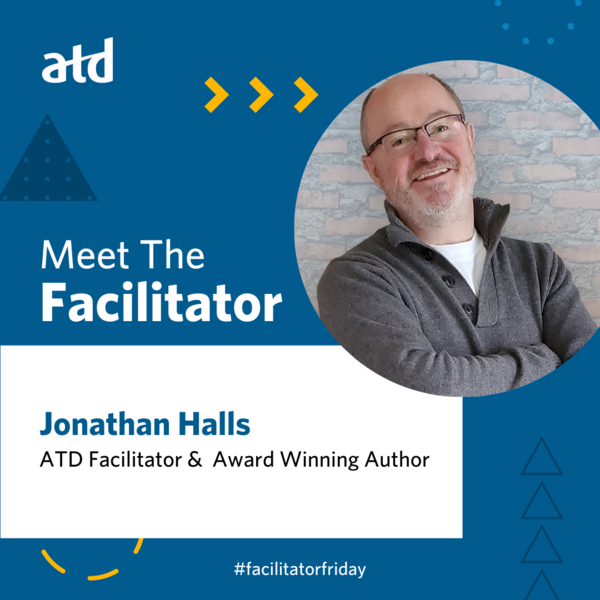ATD Blog
“It’s more important to focus on trusting the learner to learn than being polished with technology.”
Published Fri Feb 24 2023


We are fortunate to work with some of the leading facilitators in the worldwide talent development community. Our facilitators bring a wealth of experience and insight to their classrooms. We’re spotlighting their stories here.
Meet Jonathan Halls!
Jonathan is the award-winning author of Confessions of a Corporate Trainer and bestselling author of Rapid Video Development for Trainers.
What is your favorite motivational quote?
It changes every week but at the moment I like this one from Carl Rogers: “I can’t teach you anything but I can help you learn.” It emphasizes that our role is to partner with learners.
How many years have you been a facilitator? Did you find the career path, or did it find you?
I like to say I’ve been a facilitator for more than 10 years and that’s not lying. But, errr, I’ve been doing it for more than 30 years. I’m a bit unusual in that I’m not an accidental trainer. I always intended to be a trainer due to the influence of a mentor in my teenage years. In fact, I was teaching broadcasting skills in my teens, so I was geeking out on andragogy and adult learning skills before I left high school.
What is something you wish you knew before becoming a facilitator?
I wish I realized that being a polished trainer with nice slide decks and well-formatted handouts isn’t necessarily learner-centric. My bachelor’s and master’s degrees are in adult learning so I knew all the theories from Knowles to Rogers to Freire. But knowing them and practicing them are different. What took me years to learn was that the key is trusting the learner and all the knowledge, skills, and intentions they bring to the learning experience.
What is your go-to facilitation tool?
Questions are my number 1 tool, partly because they’re easier to carry than trainer toys and laptops and projectors. But mostly because when a trainer asks questions, it unlocks the learner’s long-term memory to help them build new mental models for cognitive and psychomotor learning. That’s not all–questions also provide dignity. When we ask questions, we show that we value and honor the learner’s perspective and trust their capacity to learn. And we get to learn from them too.
How has hybrid learning changed how you facilitate?
Not a whole lot. Our job is still to help learners build their skills. I think it’s more important to focus on trusting the learner to learn than being polished with technology. And I’m not a luddite. Hybrid situations still require the learner to do the work. It’s less about what we do than what the learner does.
What is your best piece of advice for anyone looking to become a facilitator?
Study how the learner builds their learning and reflect on what your role as a trainer is in helping them do that learning. Ask yourself, do I really need to present? To talk? Have cool slide decks? Or do the learners need to be doing stuff? Then grab a glass of your favorite wine, sit back, gaze into the distance, and marvel at the incredible capacity humans have to learn.
What is your favorite part about being a facilitator?
It’s the privilege we have to partner with folks as they walk on their learning journey. It’s truly awesome and it teaches us so much about life, other people, and ourselves. I love connecting all that to organizational performance, which is about helping people learn new skills, gain confidence, and help their organizations thrive. It’s an awesome part of the job.
What is your favorite song these days, the last great book you read, or your favorite hobby outside of work?
I’m a classical music buff and like some jazz. I know this sounds really nerdy but every month I get hooked on different composers. This month I’m reveling in Mozart piano concertos because of their incredible precision and light touch, especially Piano Concerto No. 21.
How have your facilitation skills and training aided you in other aspects of your personal or professional life?
Gee, where do I start and where do I stop? They help me understand people. They help me be patient (well some of the time). They help me know when to shut up. Most of all they teach me about other people and all they bring into our lives.
You've Reached ATD Member-only Content
Become an ATD member to continue
Already a member?Sign In
